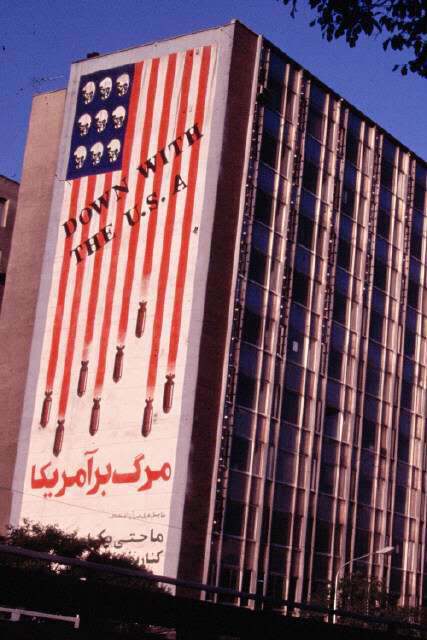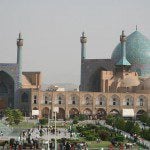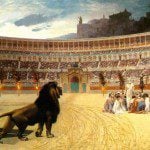
Needless to say, Marxism could not deliver on its promises, nor give dissatisfied and humiliated residents of the Near East the dignity that they craved. But what other answer was available? Well, the Islamic answer was there. It had always been there, but now its rivals were discredited. “Why,” devout Muslim thinkers asked, “should the Muslims turn to the West for clues on how to be successful?” They hadn’t needed Western assistance in the early days, when they conquered the Mediterranean world. They hadn’t needed the West when they invented algebra. This search for a solution in the West was misguided and unnecessary, modern Islamists argued. And, these thinkers pointed out, Marxism was every bit as Western as was liberal democracy and market capitalism. Karl Marx was a German, after all, and he wrote Das Kapital while sitting in the British Library in London. And, besides, as the Anglo-American poet and historian Robert Conquest put it with feigned lightheartedness in one of his lesser literary creations, Marxism brought considerable baggage with it:
There was an old Marxist called Lenin
Who did two or three million men in.
That’s a lot to have done in,
But where he did one in,
That grand Marxist Stalin did ten in.[1]
Why turn to the West when the Near East had everything that was necessary? Islamic law was every bit as sophisticated as anything that the West had to offer. Islamic doctrine presented an entire comprehensive view, not only of how one ought to live as an individual but also of how society ought to be constituted. And so we have seen an outpouring in recent years of works on Islamic economics, the Islamic view of international relations, critiques of mechanistic Western science, and fierce denunciations of Western materialism. Islam, in the hands of many thinkers, has gone on the offensive. One Iranian author, the late Jalal Al-i Ahmad, wrote a best-selling book entitled, in Persian, Gharbzadagi, literally “West-Sickness,” sometimes rendered “West-Toxification,” which has appeared in English translation under the clever title of Occidentosis..[1] Westernness, in the view of such Muslim thinkers, is a disease. It is something to be thrown off, as one would throw off a fever or, perhaps more to the point, an infection.
In recent years, there has been a widespread sense among Muslims that Islam might indeed be on the rebound. The Islamic Republic of Iran, for instance, seems to many of the faithful, and not only to Iranians, to have stood up to the West. Although quite a bit of the bloom has gone off the Iranian rose, the revolution there appeared to many a breath of fresh air. Whatever the moral qualifications of the Iranian regime—and even many of its admirers will admit to serious doubts about those—there was something in this that many in the Arab world and elsewhere in the Near East found undeniably attractive. It was much the same thing that created so much support for Saddam Hussein for many years. He was standing up to the West—an Arab, looking the presidents of France and the United States and the British prime minister right in the eye as an equal! (To paraphrase a famous remark made about another head of state, and to do so in a manner that will be acceptable to Latter-day Saint readers, the Arabs might have said something like this about Saddam Hussein: “He may be a @#$&#, but he’s our @#$&#.” And, in fact, many of them did say essentially this to me during his heyday as tyrant of Iraq.) Given the managed press that is the only source of news for many of these people, it is not surprising, therefore, that they were proud of how long first Gulf war lasted, attributing it to Saddam’s courage rather than to Western restraint.
One problem, however, is that it is very difficult for any Muslim, even the most devout, to escape the influence of the West. He may rail against it, and consign it and all its offspring to hell, but he will probably do so over a loudspeaker manufactured on the basis of Western technology. The Ayatollah Khomeini, first exiled in Iraq and then in France, communicated with his followers within Iran prior to that country’s “Islamic Revolution” by means of sermons recorded on cassette tapes. When he returned to Tehran, he flew in on a Boeing 747 jetliner and then rode in triumph through the crowds in a Chevrolet. Such facts as these never allow the Muslim to forget the fact of Western dominance.
This seemingly one-sided relationship hurts Muslim pride. Many educated Arabs are wounded by the realization of how uninformed the West is about them. They follow the West almost with obsessiveness, but the West, and especially the United States, has often been abysmally ignorant about them. Muslims feel that the West has persistently denied its debt to the civilization created by their ancestors. They are proud of their contributions to mathematics and medicine and other disciplines, yet they see no evidence that people in the West either know about these contributions or care. They feel unappreciated, especially in view of the great debt they know they owe to the West in modern times. Our ignorance, they rightly note, has practical consequences. We have tended to favor the Israelis over the Palestinians simply because we knew nothing about the Palestinians. We didn’t care about the wrongs and injustices that they had suffered because we had never heard of them. There is no Arabic equivalent to the novel or the movie Exodus. If most of us can’t find the United States on a map, and most of our high school students thought former Soviet leader Mikhail Gorbachev was a ballet dancer, it isn’t very likely that we’ll be able to find Qatar or Bahrayn, or to identify the emir of Kuwait. The terrorism and saber-rattling that have so often characterized relations with the West, the cruel taking and keeping of hostages, the horrific beheadings perpetrated by the so-called “Islamic State,” are often simply ways of getting our attention. By grabbing an American off the streets of Beirut, an immature college graduate with an identity crisis and no decent job prospects can attract the gaze of the president of the United States. It is much the same reason that leads nonentities to shoot celebrities. (John Hinckley so badly wanted the actress Jodi Foster to notice him, that he shot President Ronald Reagan.)
[1] Cited in David Pryce-Jones, Signatures: Literary Encounters of a Lifetime (New York and London: Encounter Books, 2020), 85. Robert Conquest (1917-2015) was the author of, among other things, The Great Terror: Stalin’s Purge of the Thirties (1968) and The Harvest of Sorrow: Soviet Collectivisation and the Terror-Famine (1986).
[1] Jalal Al-i Ahmad, Occidentosis: A Plague from the West, translated by R. Campbell (Berkeley: Mizan Press, 1984).












